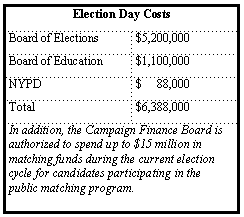 oting: What Price Democracy?
oting: What Price Democracy?
Originally published in Issue 15 - October 31, 1997
 oting: What Price Democracy?
oting: What Price Democracy?
As the city approaches Election Day, the Independent Budget Office thought you might be interested in knowing what it costs to run the various aspects of the elections.
The City pays for elections through the budgets of several agencies responsible for running the election. The Board of Elections, which manages the City's elections process, and the Campaign Finance Board, which implements the City's campaign finance law, are the primary agencies involved in a citywide election. The Board of Education and the Police Department also provide support.
Board of Elections
It costs the Board of Elections roughly $5.2 million for each citywide election, primary, general election, or runoff. Since each election involves the same 5,627 precincts throughout the five boroughs, the costs are the same for each day of balloting.
A rough breakdown of this expense is:
The CFB's administrative costs for this fiscal year are roughly $5.7 million. In an election year for City offices, CFB requests more money so that it can pay for the public funds matching program.
CFB's budget for the public match program is driven by its expectation of both the number of candidates for various offices and the competitiveness of each race. CFB's authorized ceiling for the current election cycle is $15 million for the match program. As of October 30th CFB has awarded $6.2 million to candidates participating in the program ($3.8 million for the primary election and $2.4 million for the general election). In the 1993 election cycle CFB actually awarded $6.7 million to about the same number of participating candidates (186 in 1993 and 185 in 1997). In addition, this year CFB spent $1.0 million to print and disseminate voter guides (1.9 million copies in the primary and 2.7 copies in the general)
The budget of the Board of Elections for the current fiscal year is $30.5 million. The Board examines candidate petitions, registers voters, maintains voter registration lists (now totaling nearly 3.9 million active and inactive enrolled voters), and carries out all activities directly related to the primary and general elections -- such as transporting voting machines to 1,255 polling sites and hiring 22,000 poll workers. Because its duties are mandated by state and federal law, the agency spends roughly the same amount annually regardless of the number of officials being elected or the nature of the elections (city, state, and/or federal).
Campaign Finance Board
The Campaign Finance Board oversees the City's campaign finance law and provides matching public funds to candidates. Because the law it oversees is specific to local elections, its services, unlike the Board of Elections, are only required during citywide elections. Local Law 8 which created the agency, allows candidates seeking one of five City offices (Mayor, Public Advocate, Comptroller, Borough President, and City Council) to place voluntary limits on campaign contributions they accept and the amount of money they spend in return for partial public financing. It also requires debates and regular information reporting.
Board of Education
The Board of Education opens public schools across the city from 6:00am to 9:00pm for use as polling sites. The Board of Education also cleans the facilities after the polls close thereby incurring overtime expenses for custodians ($1.1 million). In the past, the Board of Elections paid the Board of Education for use of the schools and other costs related to election day. However, now the costs are swapped: the Board of Elections covers the cost of the school board elections in exchange for free use of school resources on election days.
Police Department
The Police Department assigns one police officer to each polling site during voting hours and during the tallying of the votes recorded on the machines that evening. Officers transport the election results to precinct station houses where results are called in or transmitted by computer to police headquarters. The Department's computers generate poll information seen on television as the clerks at headquarters receive data and enter it into a central computer from which the Associated Press tabulates unofficial returns and transmits them to other news organizations. On Election Day in 1996, the NYPD incurred $88,000 in overtime expenses as a result of providing a police presence at polling sites across the City.
